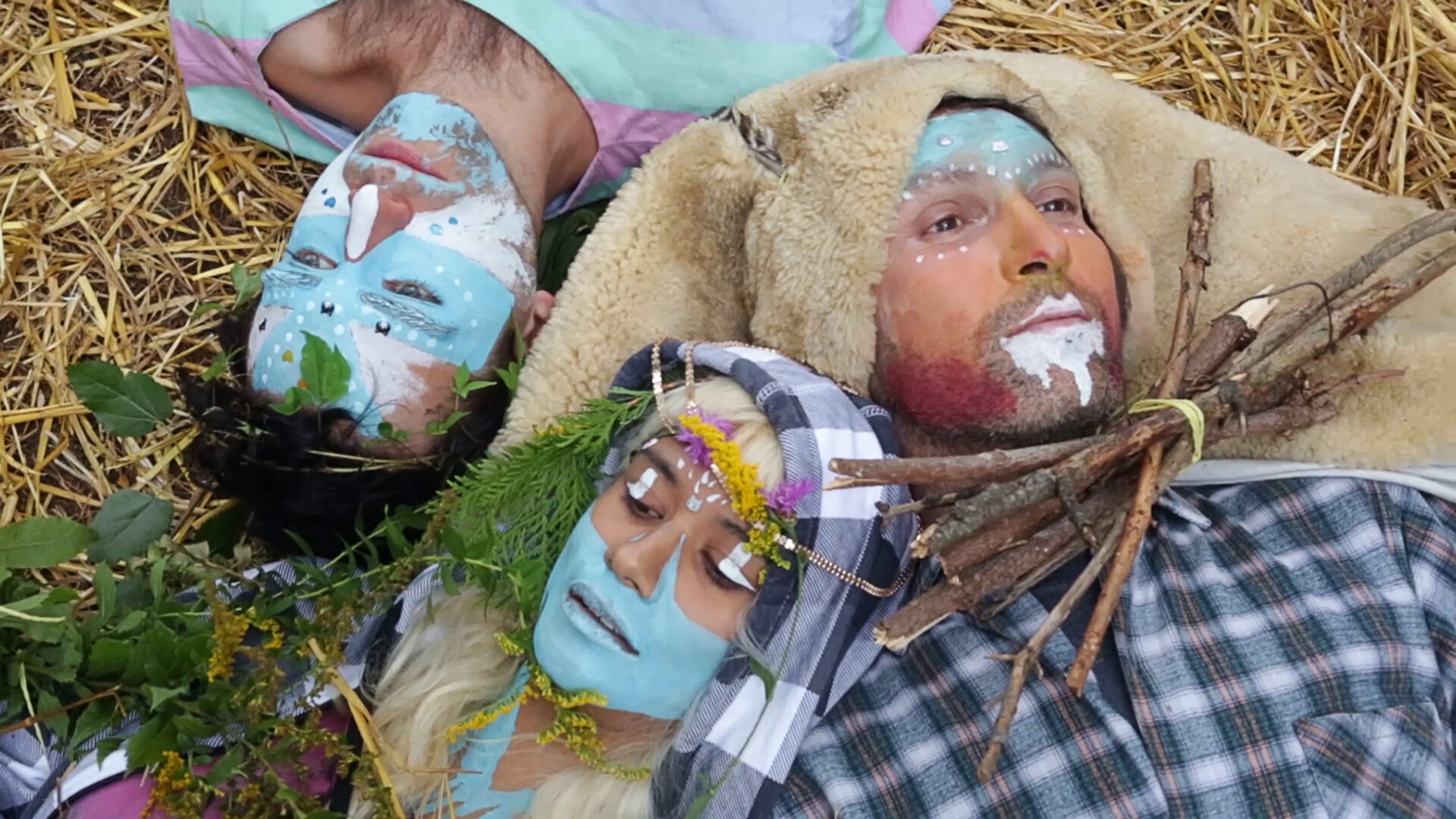melanie bonajo: Night Soil
The three works that constitute melanie bonajo’s Night Soil trilogy: Fake Paradise (2014), Economy of Love (2015) and Nocturnal Gardening (2016), depict communities that look to create alternative ways of living to the hegemonical normative social system. The trilogy is a statement to the necessity to operate outside of the constraints of the capitalist society, to forge different understandings of people as communities, to criticize the idea of economic growth and technological advancement being inherent and primary engines of human existence. The works deal with the experience of disconnection most Western people feel to nature.
The video works are set in the style of experimental documentary where the stories of the women of the films are combined with associative vignettes and portrayals of the people and of the communities. All the videos are installed in colorful and materially diverse spatial constructions that create a sort of a landscape around the work where the audience can immerse themselves in the themes and topics of the works. The installations are made by bonajo’s long-time collaborator Théo Demans together with Clemence Seilles.
Fake Paradise
Fake Paradise centers around the movement striving for the legalization of the hallucinogenic drug Ayahuasca. A psychedelic herbal mixture consumed ceremonially by various ethnic groups around the Amazon, Ayahuasca has been traditionally used in physical and mental healing processes as well as alternative medicinal practices.
In Fake Paradise bonajo examines the transformative power of psychedelic experiences and how the psychedelic practices mold the cultural ecosystems and countercultures. The film relates to the real emergence of the need in existential experiences and transformative changes of the self in contemporary people.
Economy of Love
Economy of Love presents a group of young sex workers in Brooklyn New York. They see their work as a way of regaining power and influence within the patriarchal societal order as well as in determination of the notions of desire and sexuality that are by default dominated by men.
Referring to Sumerian traditions of sacred prostitution, the women in the film propose that pleasing one’s sexual body is just as holy an action as pleasing one’s soul. Challenging the notions of capitalist framings around sexuality they form new understandings about intimacy and pleasure. At the same time, the work itself broadens the spectrum of socially established gender roles.
Nocturnal Gardening
The third part of the trilogy, Nocturnal Gardening, deals with cultivation of land and food production. The film shows, in four episodes, how women in different communities create ways to approach land cultivation, farming and food production through anti-colonial and anti-capitalist starting points.
Through self-organizing in solidarity with others they formulate counter-models to industrial food production in order to enable a more sustainable and considerate relationship with land, nature, plants, and animals. Taking an anarchist stand of love and care in their practices, the women cultivate new ethics around our co-existence with the nature.
The film Nocturnal Gardening ibelongs to the Collection of City of Pori. This exhibition puts together all the parts of the Night Soil trilogy together with installations related to the videos. Installation to Fake Paradise as well as the videos for both Fake Paradise and Economy of Love are loaned from AKINCI gallery, Amsterdam. The installations for Economy of Love and Nocturnal Gardening are on loan from Bonnefanten Museum, Maastricht. The exhibition architecture and scenography are designed by Théo Demans in collaboration with melanie bonajo and realized together with Pori Art Museum.
melanie bonajo is a Dutch artist, film-maker, somatic sex coach and educator, cuddle workshop facilitator and activist creating immersive queer spaces. bonajo is interested in communities outside the mainstream, who live or work on the margins of society, either through cultural exclusion or because they do not belong to a normative system. Issues of ethical and empathic coexistence, body politics, equality and alternative forms of perception of the world and oneself are prominent in bonajo’s work.
In collaboration with Bonnefanten Maastricht, AKINCI gallery
The exhibition is supported by Finnish Heritage Agency and Mondriaan Fund:

The exhibition is supported by Finnish Heritage Agency.

Image credit: melanie bonajo, Night Soil – Economy of Love, 2015, still from a video, Courtesy the artist and AKINCI
